Biodiversity refers to all living things globally and has been declining alarmingly fast in recent years due to hazardous human activities, including land-use changes, pollution, deforestation, climate change, and people being generally irresponsible.
The UN revealed that scientists predict that one million species out of the eight million estimated is under the threat of going extinct—with most within just a few decades away. Earlier mass extinctions eradicated around 60% to 95% of all life on earth, and it takes millions of years for ecosystems to fully recover.
There are different ways of how human intervention can devastate an ecosystem. But just like how crisis intervention or prevention platforms can help out those with problems, you can do something to help and prevent it from getting worse.
Here are different ways you can address biodiversity losses.
Recycle
The best and simplest way you can start reducing your carbon footprint and preserve biodiversity is by recycling and only buying products made from recycled materials. These include things made from paper, plastic, wood, and metal.
Practice Sustainable Shopping
Although buying ‘organic’ items is a great way to ensure your health, if you want to do the same for the environment, ensure that the product has been sustainably harvested or manufactured. Plus, it’s best to avoid buying endangered species for food, such as Bluefin tuna.
Drive Green
The simplest and easiest way you can reduce your carbon footprint and preserve biodiversity is by giving up your gas-powered car for something more eco-friendly, like an electric variation. This low-emission vehicle has a lesser impact on your surroundings. However, if you don’t have the budget for it, carpooling, commuting, and walking instead of driving everywhere is enough.
Protect Local Habitats and Welcome Wild Animals
Although you may not single-handedly save the world, you can help improve your local vicinities, which will eventually spread to the rest of the world. Take the time to clean up natural animal habitats, including forests, lakes, and other underdeveloped areas. Additionally, making your home or property welcoming for wildlife can significantly preserve their kind in your area. Whether it’s building a birdhouse, bat house, or planting local flora can go a long way.

Avoid Using Packaging
Plastic packaging is one of the most dangerous and prominent waste people accumulate every day, which can be problematic as a single plastic bottle or container takes more than 10,000 years to decompose on its own. So, the next time you’re going shopping, go package-free or bring your own eco-friendly bags.
Compost
A typical American can generate around 4.4 pounds of trash per day, and much of that is organic. Instead of throwing the organic matter away like vegetable peelings and used coffee grounds, set up a compost pile in your garden or backyard for your organic waste. Doing this keeps your garbage out of landfills and gives you natural fertilizer for your plants.
Biodiversity provides the world with quality air, water, soil, and crop pollination, significantly reducing the impact of natural hazards, keeping the planet clean and healthy. However, it’s slowly declining. But being proactive and doing any of the prevention methods mentioned can go a long way — helping the world thrive and grow long-term.

